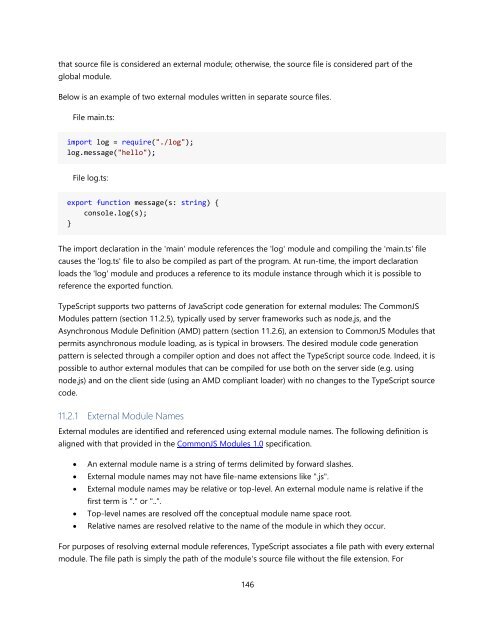TypeScript Language Specification v1.5
TypeScript Language Specification v1.5
TypeScript Language Specification v1.5
You also want an ePaper? Increase the reach of your titles
YUMPU automatically turns print PDFs into web optimized ePapers that Google loves.
that source file is considered an external module; otherwise, the source file is considered part of the<br />
global module.<br />
Below is an example of two external modules written in separate source files.<br />
File main.ts:<br />
import log = require("./log");<br />
log.message("hello");<br />
File log.ts:<br />
export function message(s: string) {<br />
console.log(s);<br />
}<br />
The import declaration in the 'main' module references the 'log' module and compiling the 'main.ts' file<br />
causes the 'log.ts' file to also be compiled as part of the program. At run-time, the import declaration<br />
loads the 'log' module and produces a reference to its module instance through which it is possible to<br />
reference the exported function.<br />
<strong>TypeScript</strong> supports two patterns of JavaScript code generation for external modules: The CommonJS<br />
Modules pattern (section 11.2.5), typically used by server frameworks such as node.js, and the<br />
Asynchronous Module Definition (AMD) pattern (section 11.2.6), an extension to CommonJS Modules that<br />
permits asynchronous module loading, as is typical in browsers. The desired module code generation<br />
pattern is selected through a compiler option and does not affect the <strong>TypeScript</strong> source code. Indeed, it is<br />
possible to author external modules that can be compiled for use both on the server side (e.g. using<br />
node.js) and on the client side (using an AMD compliant loader) with no changes to the <strong>TypeScript</strong> source<br />
code.<br />
11.2.1 External Module Names<br />
External modules are identified and referenced using external module names. The following definition is<br />
aligned with that provided in the CommonJS Modules 1.0 specification.<br />
<br />
<br />
<br />
<br />
<br />
An external module name is a string of terms delimited by forward slashes.<br />
External module names may not have file-name extensions like ".js".<br />
External module names may be relative or top-level. An external module name is relative if the<br />
first term is "." or "..".<br />
Top-level names are resolved off the conceptual module name space root.<br />
Relative names are resolved relative to the name of the module in which they occur.<br />
For purposes of resolving external module references, <strong>TypeScript</strong> associates a file path with every external<br />
module. The file path is simply the path of the module's source file without the file extension. For<br />
146


















